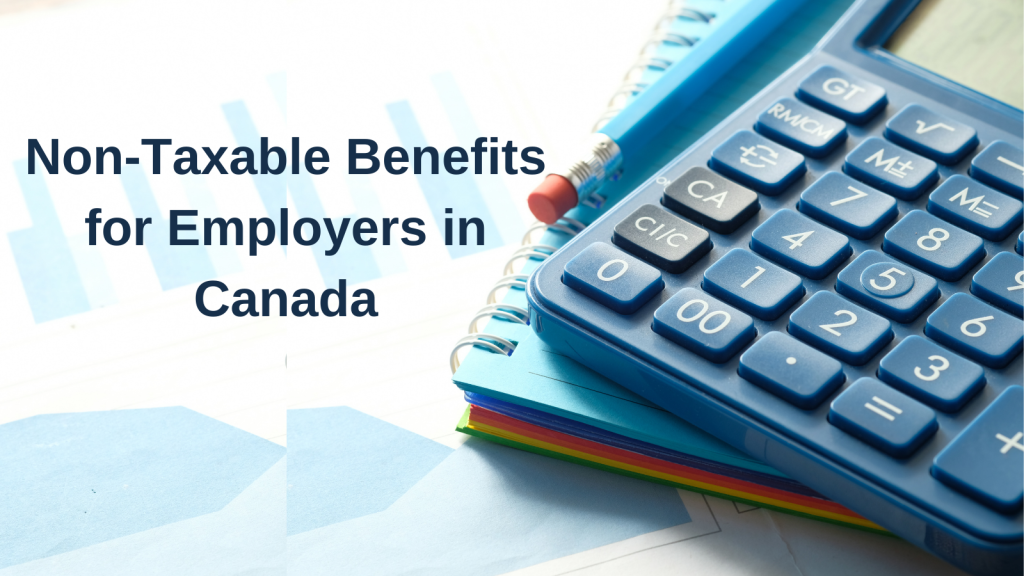Non-Taxable Benefits for Employers in Canada
Providing a competitive wage package to employees can make the difference in landing a highly sought-after candidate for your firm in the present climate of lowering unemployment rates and labor shortages in numerous industries.
Salary and earnings received in cash are taxed as employment income in Canada and are recorded on an employee’s T4 slip for tax reasons. Many perks and allowances, on the other hand, might be offered to an employee on a non-taxable basis.
A benefit is defined by the Canadian Revenue Agency (CRA) as personal goods or services that you provide or supply to your workers (or a close member of the employee – spouse, kid, or sibling). Allowances and reimbursement of an employee’s personal expenses are examples of benefits.
In this post, we’ll go through the top ten non-taxable perks that you may provide your employees as an employer.

Non-Taxable Advantages
1. Internet and cell phone services:-
The purchase of the gadget is not considered a taxable advantage if you supply your workers with a mobile phone that you own to carry out their business. If you compensate your workers for the purchase of their own device, however, the reimbursement constitutes a taxable benefit to the employee. You can refund your staff for the cost of cell phone and internet use services to assist them in their job. The compensation for service charges is exempt from taxation.
2. The Costs of Education and Professional Development:-
Tuition, textbooks, meals, travel, and lodging charges that are explicitly devoted to enhancing or maintaining your workers’ abilities are non-taxable perks.
3. Payment of Professional Fees:-
Non-taxable benefits include professional dues reimbursed to the workers that benefit you as the employer.
4. Club Dues and Recreational Facilities:-
Maintaining your workers’ health via exercise may boost productivity and morale. If the employer is the principal recipient, the expenditures paid by an in-house gym/recreational facility or arranging for your workers to utilize a recreational facility are not considered taxable benefits.
5. Awards and gifts:-
Non-cash gifts and rewards worth less than $500 per year are generally not taxable advantages. The $500 restriction does not apply to insignificant presents such as business brand apparel, mugs, or coffee. You can provide non-cash presents up to $500 to long-serving staff every 5 years as a reward. In addition, these long-service incentives are tax-free. The yearly $500 restriction is not applied to the long-service reward.
6. Automobile Allowances:-
You can compensate your workers for a fair amount of car allowance if it is based on business usage miles at a reasonable CRA authorised mileage rate. You may compute the benefit using the CRA’s online calculator for automotive benefits. A rate that is deemed unreasonable will be included in the pay of the employees. If your employee is disabled or needs a car for business purposes on a regular basis, parking spots granted to them are also taxed.
7. Guidance Services:-
Employees can get counseling services as a non-taxable benefit if it’s for re-employment or physical/mental health.
8. Loyalty Points:-
Employees are often not taxed on credit card loyalty points obtained from corporate cost reimbursements. The value of the points will be deemed a taxable advantage if they are converted into cash or acquired as part of a tax-avoidance strategy.
9. Plan for Private Health Services:-
The premium you pay for private health and dental care plan on behalf of your workers is considered a non-taxable benefit for them.
10. Short-term and long-term disability insurance:-
Short-term and long-term disability insurance premiums paid on behalf of your workers are not taxable benefits. However, if an employee files a claim and receives a disability insurance benefit, the benefit is taxable to the employee.
For further information, consult the CRA’s T4130 Employer’s Guide, which includes a full list of both non-taxable and taxable benefits. Some taxable advantages will necessitate the addition of GST/HST. You’ll need to compute payroll deductions once you’ve estimated the value of the taxable benefits and the GST/HST.
We can assist you if you’re still unsure about benefits, payroll, or the tax code. Mindspace can assist you in managing your company’s payroll and dealing with taxes! To discover more about how we may assist you, please contact us.


